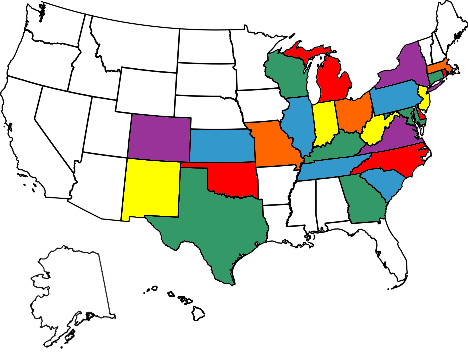Topic: WebWerms in me twees!
in Forum: Humor
Already a Member?
Click Here to Login
Not yet a Member?
Click Here to Register for Free!
Irving, TX - USA
Joined: 8/21/2004
Posts: 4273
Vette(s): #1 -1969 Corvette Coupe Riverside Gold, black interior,MN,A/C,350/350,PS,PB,window cranks.
#2 -2000 C5, black/black, 6 sp, Bose system & lots of buttons.
I think those horrid Web Worms climb up your tree trunk and web up after they eat the vegitation. Then they turn into some kind of beetle thing. Actually, they will web up in anything. I know they like the rubber weather stripping on my C3 and they like to eat the cover of the C5. Now I will have to buy a new cover.......dab-nab-it!



I know when I get back to Texas those nasty things will be webed up in my C3's rubber again and I don't like that at ALL.....
 �����
�����
My Link 
MICK - C3VR Lifetime Member #113
SPONSOR AD:: (Our Sponsors help support C3VR)
We cut most of ours out and then by two seasons they were gone. I heard in the winter to rake up all the leaves cause they live under the leaves on the ground until spring, then go back up the tree.
Heres where we got some info WebWorms
MARK
LIFETIME MEMBER #117 

Click here to see my new friend P-Racer
"Keep up the Pace"
Moderator
Duncanville, TX - USA
Joined: 11/8/2003
Posts: 20214
Vette(s): #1-1974 L-48 4spd Cp Med Red Metallic/Black deluxe int w/AC/tilt/tele./p/w-p/b/
Am-Fm/map light National/Regional/Chapter NCRS "Top Flight"
#2-1985 Bright Red/Carmine Cp.L-98/auto
Member: NCRS, NCRS Texas, Corvette Legends of Texas
Web Werm Info
The webworm, Hyphantria cunea (Drury), is a common pest of trees. It attacks more than 88 different kinds of plants, including many fruit, nut and ornamental trees and shrubs. It does not attack conifers (pines and other needle-bearing trees).
Webworms are known for the large, unsightly webs they produce. Heavy infestations are rarely fatal, but if they occur repeatedly over several years they can stress trees and make them more susceptible to drought, disease or other insect pests which can be fatal. With doubt the stress can affect a nut crop.
The feeding preferences of webworms vary from one place to another. In west Texas, mulberry, poplar and willow are preferred; oak, hickory and pecan are most often attacked in east Texas. While Pecans and Black Walnut are favored in the Texas Hill Country.
Description
The webworm moth is white and has a wing span of 1 to 11/2 inches. Sometimes there are small, dark spots on the forewings. Full-grown larvae are approximately 1 inch long, pale green or yellow, and covered with tufts of long, white and black hairs. There are two distinct races of the fall webworm, which can only be identified during the larval stage. Larvae in the orange race have orange heads and orange tubercles, while members of the black race have black heads and tubercles. It is not unusual to find both in the same area. Webworms often cover entire branches with their webs. In extreme infestations whole trees may be covered. Larvae feed within the web, eating the tender parts of leaves and leave the larger veins and midrib.
Biology
There are two to four generations of webworms each year in Texas. Four generations occur in southern portions of the state, while two to three generations occur in the northern areas. The first generation occurs as early as April in south Texas and as late as June around Lubbock and Amarillo. The last generation of the year, which occurs in the fall, is usually the most damaging and gives the insect its name.
Webworms over winter as pupae on the ground or on rough tree bark. Female moths deposit hair-covered egg masses on the undersides of the leaves of their food plants. An egg mass may be deposited in either a single or double layer and can contain up to 600 eggs. Each female moth will deposit only one egg mass. Egg masses of the walnut caterpillar, another common pest on pecans, are not covered with hairs. These larvae were hatched last summer. It is wise, to keep leaves from accumulating on the ground.
As larvae consume leaves within the web, they expand the web to take in more foliage. All larvae within a web are the offspring of a single egg mass. Larvae will molt six or seven times before leaving the webbing to pupate. The life cycle from egg to adult requires approximately 50 days.Adams' Apple 2007-07-12 18:47:49
The webworm, Hyphantria cunea (Drury), is a common pest of trees. It attacks more than 88 different kinds of plants, including many fruit, nut and ornamental trees and shrubs. It does not attack conifers (pines and other needle-bearing trees).
Webworms are known for the large, unsightly webs they produce. Heavy infestations are rarely fatal, but if they occur repeatedly over several years they can stress trees and make them more susceptible to drought, disease or other insect pests which can be fatal. With doubt the stress can affect a nut crop.
The feeding preferences of webworms vary from one place to another. In west Texas, mulberry, poplar and willow are preferred; oak, hickory and pecan are most often attacked in east Texas. While Pecans and Black Walnut are favored in the Texas Hill Country.
Description
The webworm moth is white and has a wing span of 1 to 11/2 inches. Sometimes there are small, dark spots on the forewings. Full-grown larvae are approximately 1 inch long, pale green or yellow, and covered with tufts of long, white and black hairs. There are two distinct races of the fall webworm, which can only be identified during the larval stage. Larvae in the orange race have orange heads and orange tubercles, while members of the black race have black heads and tubercles. It is not unusual to find both in the same area. Webworms often cover entire branches with their webs. In extreme infestations whole trees may be covered. Larvae feed within the web, eating the tender parts of leaves and leave the larger veins and midrib.
Biology
There are two to four generations of webworms each year in Texas. Four generations occur in southern portions of the state, while two to three generations occur in the northern areas. The first generation occurs as early as April in south Texas and as late as June around Lubbock and Amarillo. The last generation of the year, which occurs in the fall, is usually the most damaging and gives the insect its name.
Webworms over winter as pupae on the ground or on rough tree bark. Female moths deposit hair-covered egg masses on the undersides of the leaves of their food plants. An egg mass may be deposited in either a single or double layer and can contain up to 600 eggs. Each female moth will deposit only one egg mass. Egg masses of the walnut caterpillar, another common pest on pecans, are not covered with hairs. These larvae were hatched last summer. It is wise, to keep leaves from accumulating on the ground.
As larvae consume leaves within the web, they expand the web to take in more foliage. All larvae within a web are the offspring of a single egg mass. Larvae will molt six or seven times before leaving the webbing to pupate. The life cycle from egg to adult requires approximately 50 days.
Joel Adams
C3VR Lifetime Member #56 ![]()
My Link 
(click for Texas-sized view!) NCRS
"Money can't buy happiness -- but somehow it's more comforting to cry in a CORVETTE than in a Kia"
I think I now know more about this subject than I want.
Knowledge=power, but I'm getting a little queezy.


Save the Wave!
Support the National Corvette Museum
Support the National Corvette Museum
Moderator
Duncanville, TX - USA
Joined: 11/8/2003
Posts: 20214
Vette(s): #1-1974 L-48 4spd Cp Med Red Metallic/Black deluxe int w/AC/tilt/tele./p/w-p/b/
Am-Fm/map light National/Regional/Chapter NCRS "Top Flight"
#2-1985 Bright Red/Carmine Cp.L-98/auto
Member: NCRS, NCRS Texas, Corvette Legends of Texas
What did you just call me?!?!?!?  I don't think that kind of language is called for...you should be ashamed of yerself...I'm tellin...
I don't think that kind of language is called for...you should be ashamed of yerself...I'm tellin... 

 I don't think that kind of language is called for...you should be ashamed of yerself...I'm tellin...
I don't think that kind of language is called for...you should be ashamed of yerself...I'm tellin... 

Joel Adams
C3VR Lifetime Member #56 ![]()
My Link 
(click for Texas-sized view!) NCRS
"Money can't buy happiness -- but somehow it's more comforting to cry in a CORVETTE than in a Kia"
Indianapolis, IN - USA
Joined: 9/3/2006
Posts: 2430
Vette(s): Silver 1974 Convertible - L82 4 speed
Low miles (was only 8,900 when I bought it in March 2006) - Now 54K miles. Original owner bought it as an investment for son's college expenses.
2008 Jetstream Blue Convertible
[QUOTE=cilrah]Hey Joel I had to cut them sucka's outta my tree. I got a ladder as tall as I could and cut the effected branches out. It looked like a whole in the tree but grew right back in the following year.[/QUOTE]
We cut the affected branches off, then put "Sevin" (commercially available pesticide) in the sprayer and covered the rest of the trees in hopes of keeping them away.
They were pretty high up in the tree though, so I got them down the safe way - I had the wife go up the ladder
I wanted a Corvette my whole life, but I never dreamed of all the wonderful people I would meet because of it!
[QUOTE=dnv]Ya know what they say...
You can lead a hor ti culture but you can't make her think


[/QUOTE]
OK Dennis, how long have you been waiting to fit that into a conversation
Dave
Lifetime Member #116
Dave's '82 


Greensburg, IN - USA
Joined: 9/24/2003
Posts: 5189
Vette(s): Previous: 1984 Coupe, 1988 Maroon Coupe, 1989 Coupe, 2001 Roadster Present: 1967 Stingray Roadster, 1976 Stingray Coupe, 1989 Roadster..
Hey Horte Joel... Why don't ye bury one o dem pruner thangz on a stick from somebody an cut em down? Purt near all of da pow'r compnies got em...
Course bein da pyro ah am I kinda like ta burn em out.. (Keep ah waterin hose close buy doh...)
Course bein da pyro ah am I kinda like ta burn em out.. (Keep ah waterin hose close buy doh...)

in Forum: Humor
SPONSOR AD: (Our Sponsors help support C3VR)







2014216132127r.jpg)




